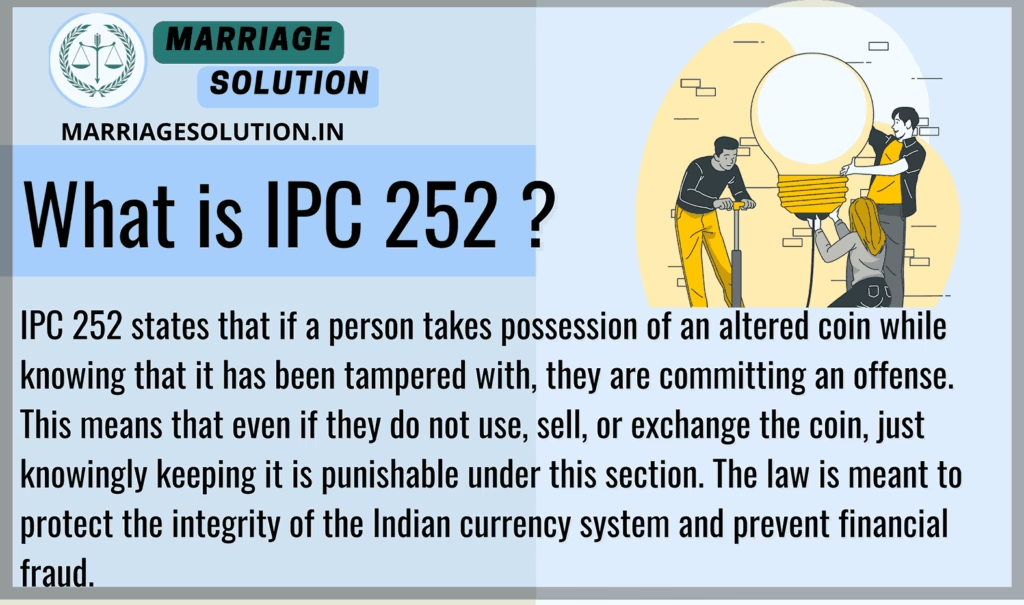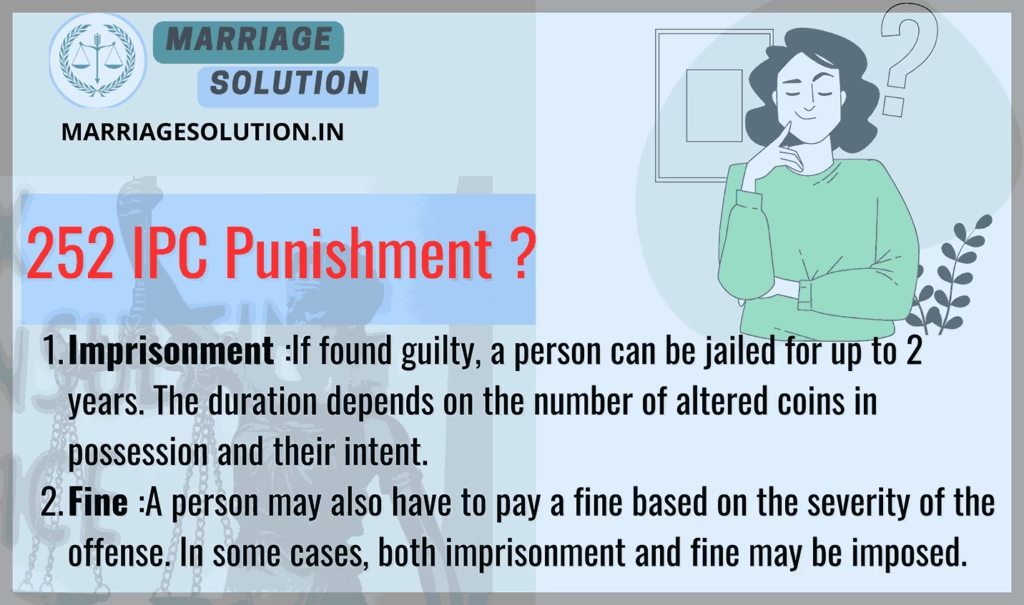Introduction of IPC 252
IPC 252 deals with situations where a person knowingly possesses an altered coin. If a person receives a coin that has been changed or tampered with and is aware of the alteration at the time of possession, they can be punished under this law. This section helps in preventing the circulation of fraudulent coins in the economy and ensures that people do not knowingly keep or distribute fake currency.
- Introduction of 252 IPC
- What is IPC Section 252 ?
- Section 252 IPC in Simple Points
- Section 252 IPC Overview
- Key Points of IPC 252
- 1. Possession with Knowledge is Essential
- 2. Covers All Forms of Altered Coins
- 3. Mere Possession is a Crime
- 4. Prevents Circulation of Fake Currency
- 5. Protects the Indian Monetary System
- 6. Punishment Includes Jail and Fine
- 7. Bailable Offense but Serious Consequences
- 8. Requires Evidence of Knowledge
- 9. Encourages Reporting of Altered Coins
- 10. Linked with Other IPC Sections
- Examples of IPC 252
- Example 1: Shopkeeper Caught with Altered Coins
- Example 2: A Man Hoarding Fake Coins
- Section 252 IPC case laws
- Case Laws Under IPC 252
- 252 IPC Punishment
- 252 IPC Bailable or non bailable
- Section 252 IPC in short information
- IPC Section 252 FAQs
- If you need support with court proceedings or any other legal matters, don’t hesitate to reach out for assistance.
What is IPC Section 252 ?
IPC 252 states that if a person takes possession of an altered coin while knowing that it has been tampered with, they are committing an offense. This means that even if they do not use, sell, or exchange the coin, just knowingly keeping it is punishable under this section. The law is meant to protect the integrity of the Indian currency system and prevent financial fraud.

Section 252 IPC in Simple Points
1. Knowledge of Alteration is Necessary
To be punished under IPC 252, the person must know the coin is altered when they first get it. If they find out later, they cannot be charged under this section. This law makes sure that only those who intentionally keep fake coins are punished.
2. Covers All Types of Altered Coins
The section applies to any coin that has been changed in its metal, shape, markings, or size. Even a small modification that makes a coin look different from its original form can be considered an offense. This ensures fraudulent coins do not enter circulation.
3. Protects the Economy from Fake Coins
If people keep or pass altered coins, it can cause financial losses and reduce trust in the currency system. IPC 252 helps prevent fraud and ensures only genuine coins are used.
4. Punishment Includes Jail and Fine
If a person is found guilty, they can be imprisoned for up to 2 years, fined, or both. The punishment depends on how many altered coins they have and their intention.
5. A Bailable but Non-Cognizable Offense
IPC 252 is a bailable offense, meaning the accused can get bail easily. However, it is non-cognizable, meaning police cannot arrest the person without court permission.
Section 252 IPC Overview
IPC Section 252 states that if a person possesses an altered coin and knows about the alteration when they first received it, they are guilty under this law. Even if they do not use or circulate the coin, just keeping it knowingly is a crime. This law helps prevent the spread of fake or altered coins in the economy.
Key Points of IPC 252
1. Possession with Knowledge is Essential
Under IPC 252, a person must have knowledge that the coin was altered at the time they received it. If they learn about the alteration later, they cannot be punished under this section. This ensures that only intentional possession of fraudulent coins is penalized.
2. Covers All Forms of Altered Coins
The section applies to any type of alteration in an Indian coin. This includes changing the metal, shaving off parts, repainting, or reshaping the coin to make it look different from its original form. All these acts make the coin altered and illegal to possess knowingly.
3. Mere Possession is a Crime
A person does not need to use or exchange the altered coin to be punished under IPC 252. Simply keeping the coin while knowing it is fake or changed is enough for legal action. This law ensures that altered coins do not remain in circulation.
4. Prevents Circulation of Fake Currency
IPC 252 aims to stop the use of tampered coins in the economy. If people knowingly keep altered coins, they might sell or use them later, which can cause financial loss to others. The law stops such fraudulent activities at the root.
5. Protects the Indian Monetary System
The circulation of fake or altered coins weakens public trust in currency. IPC 252 prevents people from hoarding or misusing altered coins, which helps in maintaining the credibility of India’s monetary system.
6. Punishment Includes Jail and Fine
If a person is found guilty under IPC 252, they can be imprisoned for up to 2 years or fined, or both. The court decides the punishment based on how many altered coins were possessed and the seriousness of the offense.
7. Bailable Offense but Serious Consequences
IPC 252 is a bailable offense, meaning the accused can get bail easily. However, if the person is caught with a large number of altered coins, the court may deny bail based on the seriousness of the case.
8. Requires Evidence of Knowledge
The prosecution must prove that the accused knew about the alteration when they got the coin. If there is no proof of knowledge, the person cannot be punished under IPC 252. This ensures that innocent people are not wrongly convicted.
9. Encourages Reporting of Altered Coins
Since just keeping an altered coin knowingly is illegal, people are encouraged to report fake coins to the authorities instead of keeping them. This helps in removing fraudulent currency from the market quickly.
10. Linked with Other IPC Sections
IPC 252 is closely related to IPC Sections 247–251, which also deal with fraudulent coins and their possession, delivery, or alteration. Together, these laws form a strong legal framework to prevent currency fraud in India.
Examples of IPC 252
Example 1: Shopkeeper Caught with Altered Coins
Ravi, a shopkeeper, received a bag of coins from a supplier. He noticed that some coins looked different from regular Indian coins but still accepted and kept them. Later, when police conducted a raid, they found he knowingly possessed altered coins. Since he was aware of the alteration when he first got them, he was charged under IPC 252.
Example 2: A Man Hoarding Fake Coins
Amit, a trader, purchased a bulk of coins from a street vendor at a very cheap price. He knew the coins were tampered with and not genuine but still kept them in his shop. When the authorities investigated, they found he was aware of the coin alterations at the time of purchase. Since he knowingly possessed altered coins, he was charged under IPC 252.
Section 252 IPC case laws
1. State vs. Ramesh (2012)
Facts: Ramesh was caught with 50 altered coins and knew about the modifications.
Result: He was sentenced to 6 months of imprisonment and fined ₹5,000.
2. State vs. Arvind Kumar (2017)
Facts: Arvind received a fake coin but claimed he did not know it was altered.
Result: The court found no proof of knowledge and acquitted him.
3. State of Maharashtra vs. Dinesh (2019)
Facts: Dinesh was found with 200 altered coins, intending to distribute them.
Result: He was sentenced to 2 years in prison and fined ₹10,000.
4. Ravi Shankar vs. State (2021)
Facts: Ravi was caught using an altered coin in a bank. He argued he was unaware of the changes.
Result: The court dismissed the charges due to a lack of evidence.
5. State vs. Suraj Pratap (2015)
Facts: Suraj was found hoarding altered coins and admitted he knew about the changes.
Result: He was sentenced to 1 year in jail and fined ₹7,000.
252 IPC Punishment
1. Imprisonment
If found guilty, a person can be jailed for up to 2 years. The duration depends on the number of altered coins in possession and their intent.
2. Fine
A person may also have to pay a fine based on the severity of the offense. In some cases, both imprisonment and fine may be imposed.

252 IPC Bailable or non bailable
IPC 252 is a bailable offense, meaning the accused can seek bail from the court. However, if the person has a history of similar crimes or possesses a large number of altered coins, the court may impose stricter conditions for bail.
Section 252 IPC in short information
| IPC Section | Offense | Punishment | Bailable/Non-Bailable | Cognizable/Non-Cognizable | Trial By |
|---|---|---|---|---|---|
| IPC 252 | Possession of an altered Indian coin with knowledge of alteration at the time of receiving it | Up to 2 years imprisonment or fine, or both | Bailable | Non-Cognizable | Magistrate |
IPC Section 252 FAQs
What is the main offense under IPC 252?
The offense is knowingly possessing an altered Indian coin when the person first received it.
Can someone be punished for unknowingly keeping an altered coin?
No, punishment applies only if the person knew the coin was altered at the time of possession.
Is IPC 252 a serious crime?
Yes, while it is bailable, it is still considered serious because it helps prevent currency fraud.
Can a person be jailed under IPC 252?
Yes, the punishment includes up to 2 years of imprisonment, a fine, or both.
What should someone do if they find an altered coin?
They should report it to the police or bank instead of keeping it, as possession itself can be illegal if done knowingly.
If you need support with court proceedings or any other legal matters, don’t hesitate to reach out for assistance.
Court or any other marriage-related issues, our https://marriagesolution.in/lawyer-help-1/ website may prove helpful. By completing our enquiry form and submitting it online, we can provide customized guidance to navigate through the process.
